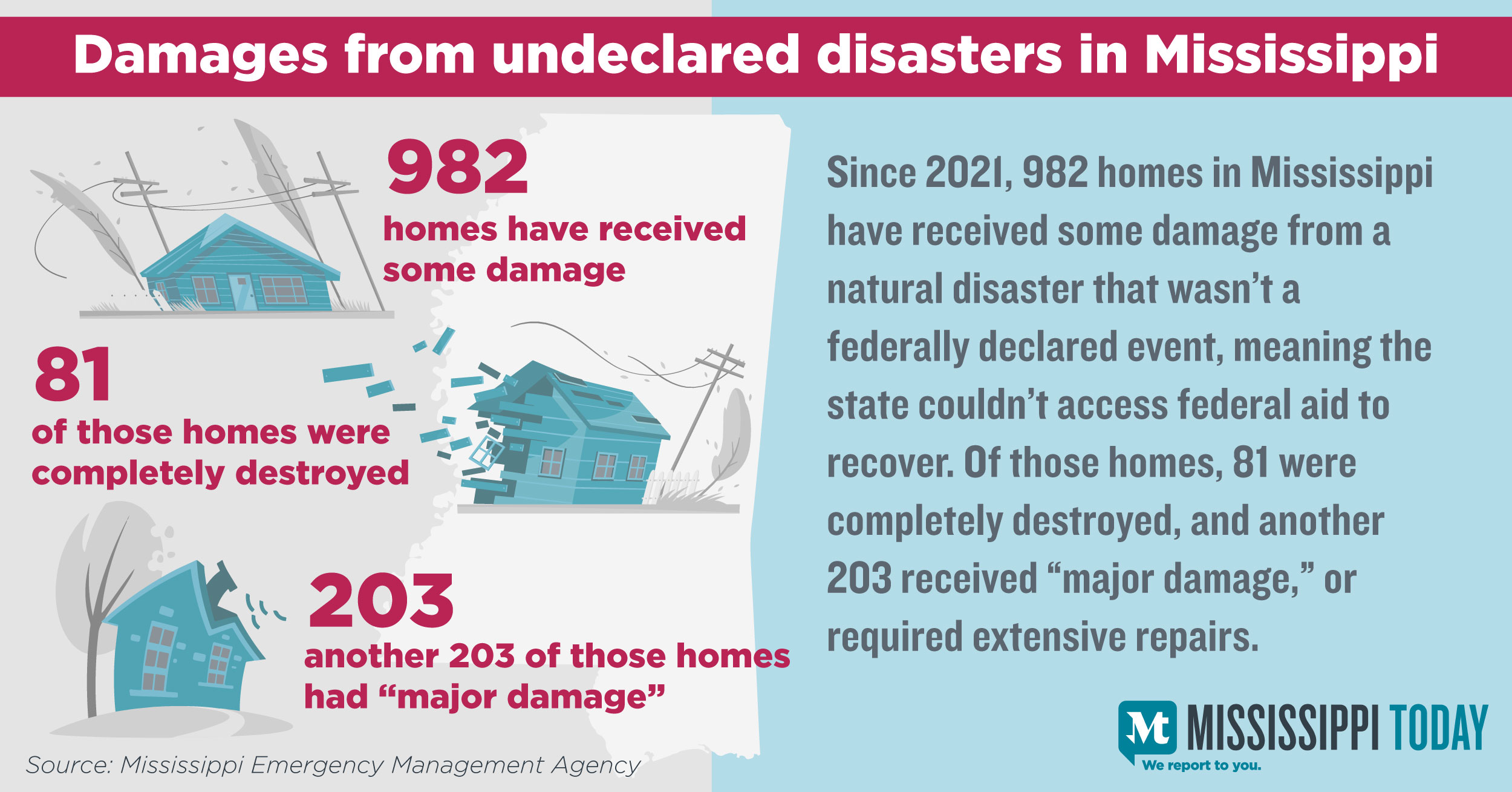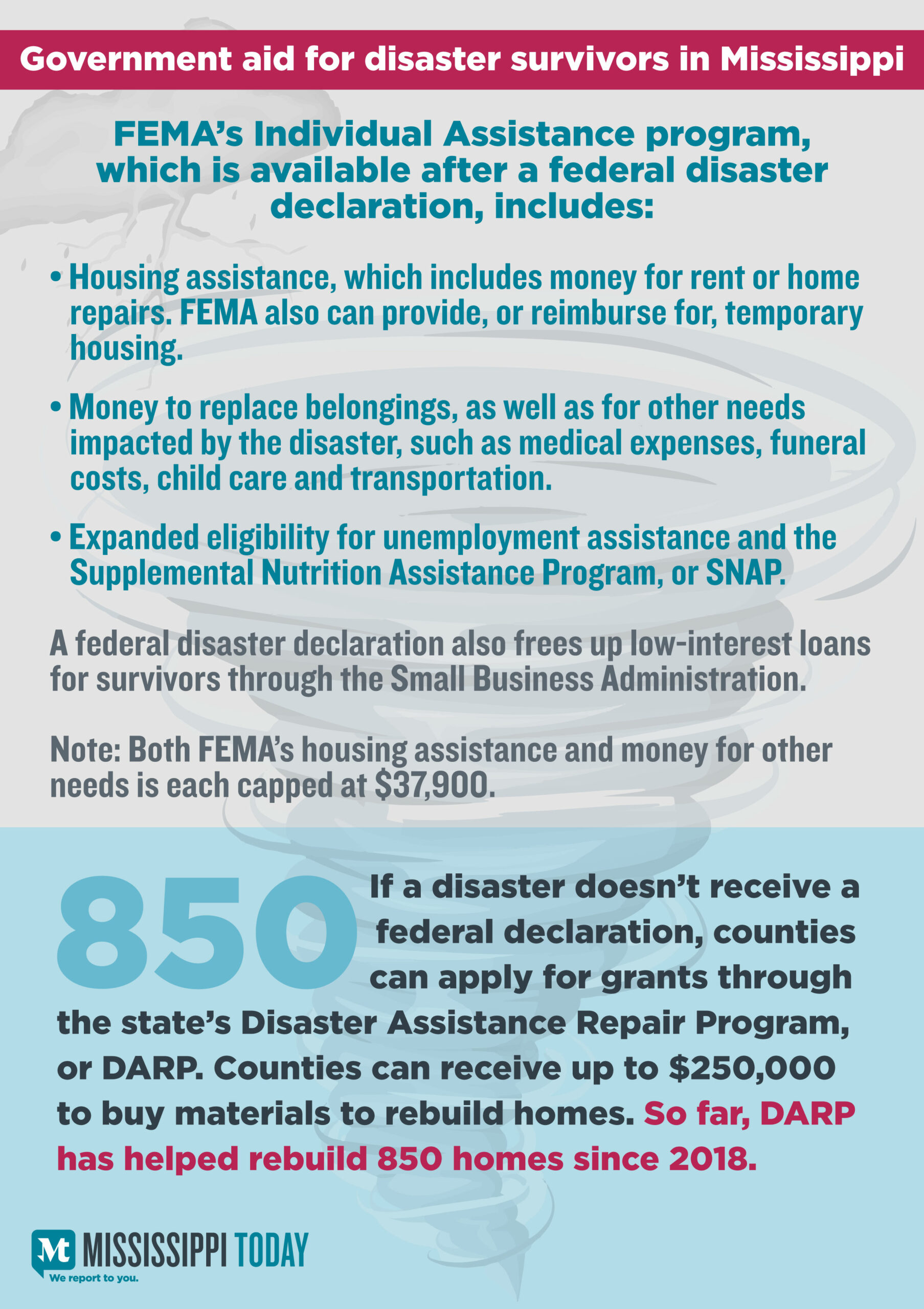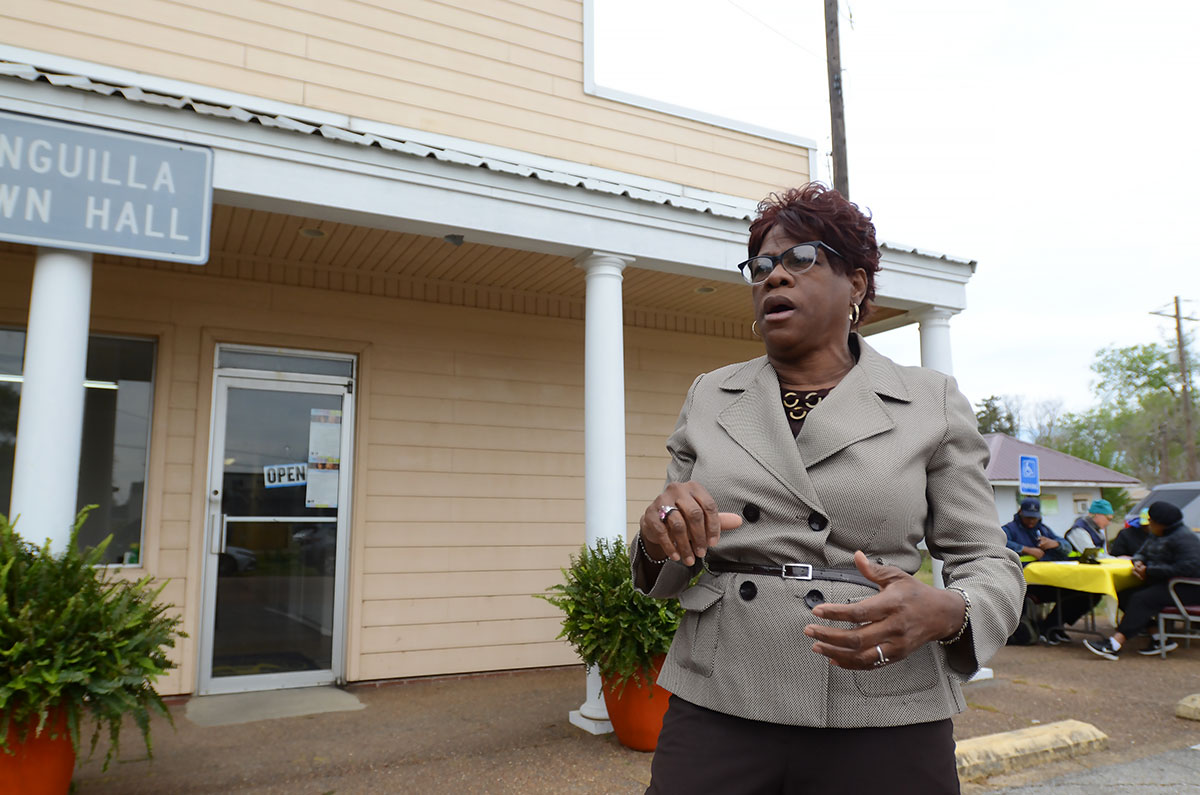Mississippi Today
When disasters are deemed too small, rural Mississippi struggles to recover
Under a mystic blend of pink lightning and green sky, Victoria Jackson called her daughter in a panic, warning her of the news: A tornado was on a path towards Rolling Fork.
Her daughter was working that March night at Chuck’s Dairy Bar, a staple of the small, south Delta town. Along with some customers, Jackson’s daughter, Natasha, nestled into one of the coolers in the restaurant.
Hours later, once the storm blew by, Jackson headed to find her daughter, navigating through debris. She found Natasha shaking, in tears. While the tornado tore the rest of Chuck’s into shreds, the cooler and those inside it were safe.
“I thank God that I called her and told her to get down,” Jackson told Mississippi Today.
The tornado killed 14 people in Sharkey County, and left Rolling Fork with little resemblance of its prior self. While the Jacksons didn’t lose anyone or anything that night, the reason they were in Rolling Fork in the first place is because, three months prior, they lost everything.

The first tornado the Jacksons survived wiped away their homes last December, tearing up a trailer park where they lived in Anguilla. Victoria, her sister, aunt, cousin and everyone in their families lost their homes, among five total that were destroyed. About 20 members of the family had to relocate a few miles down Highway 61 to a motel in Rolling Fork. Many of them, including Victoria, are still there.
As is often the case for rural disaster survivors, the damages they endured were too small to trigger crucial federal aid. Victoria didn’t have home insurance and lost her job after the storm. Now, nearly six months later, her family hasn’t seen a cent of government disaster aid, and are instead counting on donations to put them in a real home again.
Disaster recovery is already an often difficult and drawn-out process. But for rural, poor towns like Anguilla, a town of 496 people, it’s even tougher.
When people think about disaster recovery, they often think of “FEMA” – the Federal Emergency Management Agency, the national hub of government disaster aid. In reality, though, a vast majority of the country’s disasters don’t receive any FEMA money. They’re what experts call “undeclared” events.
“If you were to aggregate all the losses tied to undeclared disasters, they actually are more costly than typically declared disasters,” said Gavin Smith, a professor of Landscape Architecture and Environmental Planning at North Carolina State University who has helped lead recovery efforts in multiple states.

In Mississippi, nearly a thousand homes have been damaged in undeclared disasters in just the last two years, state records show.
FEMA aid, which comes when the president signs a disaster declaration, is reserved for the larger disasters that leave states needing additional resources. But when a disaster doesn’t meet that threshold, most states, including Mississippi, can’t replicate the kinds of services FEMA can offer.
The programs states receive after a federal declaration include: paying for public infrastructure repairs, putting people in temporary housing, sending direct payments to survivors, expanding safety net programs like food stamps and uninsurance benefits, among others.
Since more often than not, FEMA money is unavailable, many disaster survivors rely on their home insurance to pay for repairs.
But low-income, uninsured families like the Jacksons have to instead depend on the slow, complex network of volunteers and charities. Nonprofits and national religious groups help struggling communities recover all over the country, collecting donations to help rebuild homes, and providing otherwise costly labor for free. But that process takes time.
“If they’re back and recovered within six months, that is like warp speed for these organizations,” said Michelle Annette Meyer, the director of the Hazard Reduction & Recovery Center at Texas A&M University. “At best, they’re looking at a year-long process to get the donations in, confirm the paperwork, get the volunteers and get the materials donated.”
For Sharkey County, where Anguilla and Rolling Fork are, the nonprofit Delta Force handles disaster recovery, finding new homes for survivors after undeclared events. Delta Force’s chairman, Martha Bray, wouldn’t comment on specific cases for privacy reasons, only saying that they’re waiting for enough donations to come in to buy new mobile homes for the Jacksons.
“It’s going to be a long process, that’s all we hear,” Victoria Jackson said.

Last December, just before Christmas and after the tornado destroyed her home, Jackson lost her retail job at a local shop. She said her boss didn’t let her come back despite giving her time off after the storm, and then listed her as having quit, which blocked her from unemployment benefits.
Now, she’s sharing a two-bed room with her husband and six kids at the Rolling Fork Motel.
Jackson said she received $2,500 in initial donations from local churches and charities. But expenses like food, gas, laundry, and taking care of her children quickly dried that money up. Since her daughter Natasha lost her job at Chuck’s Dairy Bar, the family’s relying on her husband’s truck-driving job to keep them afloat.
After the December tornado, Anguilla Mayor Jan Pearson reached out to state and U.S. representatives, hoping that they could appeal for government assistance. The traces of the tornado were widespread in the small town, damaging businesses and even blowing the roof off the town’s middle school, forcing students to relocate.
“I wrote all of them a letter,” Pearson said. “However, to no avail. We did not get anything.”
County officials, Pearson said, told her the damages didn’t meet the threshold for federal assistance.
“I keep hearing we didn’t meet the threshold,” she said. “Well I asked somebody, ‘Will you tell me what the threshold is?’ No one could tell me what the threshold is.”

For Individual Assistance, the FEMA program that includes housing and other direct support for survivors, there is no set threshold, officials told Mississippi Today.
“It is kind of subjective,” FEMA spokesperson Mike Wade said.
FEMA weighs several factors, such as the degree of damages and the amount of uninsured losses, when deciding if a declaration is justified. The agency categorizes damages into several categories, ranging from “affected” to “destroyed.”
But to local and state officials, FEMA’s criteria is unclear.
In the summer of 2021, for instance, heavy rain flooded 284 homes in the Delta. While local officials pleaded for federal support, the state informed them that not enough of the homes received “major damage,” which FEMA defines as needing “extensive repairs.”
Last March, 33 tornadoes touched down in Mississippi, destroying 42 homes across a dozen counties. The state applied for a federal declaration, but was denied.
While there’s no set threshold, the Mississippi Emergency Management Agency estimated that at least 50 homes need major damage to earn a federal declaration.
But the damages from undeclared disasters in just the last couple years dwarf that number.
Since 2021, 982 homes in the state received some damage from an undeclared natural disaster, according to records from MEMA; 81 of those homes were completely destroyed, and another 203 received major damage.
“When you look at only one of (the undeclared disasters), the damage may be relatively small,” said Andrew Rumbach, a senior fellow at the Urban Institute whose research focuses on rural recovery efforts. “But when you add all those up across the state, it actually cumulatively could be much more important than some of those big events that do get that support.”
Anguilla has just 250 households, according to the Census. Sharkey County Supervisor Jesse Mason, who represents Anguilla, wondered how such a small place could reach the amount of damages that FEMA looks for.
“I don’t know what the magic number is,” Mason said. “I guess maybe it had to tear the whole town up.”

Rural areas have an especially hard time getting FEMA disaster aid, experts say. Mississippi was the fourth most rural state according to a 2010 Census survey, the latest with such data. Sharkey County, home to 3,488 people, is the second least populated county in the state. Neighboring Issaquena County is the first.
“The more rural you are and the more scattered your population and assets are, sometimes those kind of events are the ones that slip under the radar compared to the events where there’s media, for example, to immediately cover it, or there’s political pressure to immediately make declarations,” Rumbach said.
Mississippi has a program that sends money to counties after undeclared disasters. The Disaster Assistance Repair Program, or DARP, works with local nonprofits, and sends up to $250,000 for materials to rebuild homes. Meyer, the Texas A&M professor, said that’s more than what most states do after undeclared events.
Since 2018, DARP has helped rebuild 850 homes in 22 counties. But Sharkey County hasn’t applied for DARP funds to help the Anguilla survivors, and officials couldn't be reached to explain why.
Every county in the state has emergency management officials. But in Sharkey County, there are only two such employees, and both work part-time. Counties with lower tax bases and less capacity to do damage assessments struggle to make the case for disaster declarations, Rumbach said.
One of those two employees, Natalie Perkins, also runs the local weekly newspaper. After the Rolling Fork disaster, which President Joe Biden approved for federal aid, Perkins saw firsthand the difference a declaration makes.
“When you have a declared disaster, everyone comes out of the woodwork to help,” she said. “But when you have an undeclared (event), you don’t get the attention, you don’t get the donations, you don’t get the federal and state funding that you do in a declared disaster. That’s just the bottom line.”

On the morning of Mar. 29, five days after the tornado in Rolling Fork, which also damaged parts of Anguilla, Mayor Pearson scrambled to help FEMA officials set up a booth outside of the town hall.
Pearson sat down with Mississippi Today to talk about the December tornado, the one that displaced the Jacksons. She emphasized that she didn’t want to take away attention from what happened in Rolling Fork. But she couldn’t hold back frustration over the lack of help Victoria Jackson and her family received.
“These people just three months ago lost their homes,” the mayor said. “I can’t equate Rolling Fork with Anguilla. But come on now, people are people, humans are humans. The (Jacksons) left Anguilla and came to Rolling Fork. Now a tornado hit Rolling Fork. These people don’t have anything, and you’re telling them they can’t qualify (for FEMA aid)?”

At the motel, the Jacksons accused the owner of poor treatment, saying he recently raised their weekly rent to $400, and charges extra to wash their sheets. When reached for comment, the motel staff said the owner was out of the country and couldn’t comment. Meanwhile, the Jacksons don’t know how much longer they’ll be able to afford the room.
That Wednesday, while federal officials were in Anguilla, Victoria tried to apply for FEMA aid. They called back later, she said, telling her she’d been denied. While the agency won’t comment on specific cases, FEMA confirmed that aid wasn’t available for people in her situation.
“We just need the help that they’re giving other people,” Jackson said, wondering why she and her family had been left out. “Anguilla is Sharkey County, Rolling Fork is Sharkey County, so all this should be combined together, right? Help for everybody, right?”
This article first appeared on Mississippi Today and is republished here under a Creative Commons license.
Mississippi Today
Pharmacy benefit manager reform likely dead
Hotly contested legislation that aimed to increase the transparency and regulation of pharmacy benefit managers appeared dead in the water Tuesday after a lawmaker challenged the bill for a rule violation.
The bill was sent back to conference after Rep. John Hines, D-Greenville, raised a point of order challenging the addition of code sections to the bill, which will likely kill it.
House members in the past have chosen to turn a blind eye to the rule, which would require the added code sections to be removed when the bill is returned to conference. This fatal flaw will make it difficult to revive the legislation.
“It will almost certainly die,” said House Speaker Jason White, who authored the legislation. “And you can celebrate that with your pharmacist when you see them.”
“…This wasn’t ‘gotcha.’ Everybody in this chamber knew that code sections were added, because the attempt was to make 1123 more suitable to all the parties.”
The bill sought to protect patients and independent pharmacists, who have warned that if legislators do not pass a law this year to regulate pharmacy benefit managers, which serve as middlemen in the pharmaceutical industry, some pharmacies may be forced to close. They say that the companies’ low payments and unfair business practices have left them struggling to break even.
The bill underwent several revisions in the House and Senate before reaching its most recent form, which independent pharmacists say has watered the bill down and will not offer them adequate protection.
House Bill 1123, authored by White, originally focused on the transparency of pharmacy benefit managers. The Senate then beefed up the bill by adding provisions barring the companies from steering patients to affiliate pharmacies and prohibiting spread pricing – the practice of paying insurers more for drugs than pharmacists in order to inflate pharmacy benefit managers’ profits.
Independent pharmacists, who have flocked to the Capitol to advocate for reform this session, widely supported the Senate’s version of the bill.
The Senate incorporated several recommendations from the House into its bill, saying that they believed that the legislation would have the House’s support.
Instead, the House sent the bill to conference and requested additional changes, including new language that would eliminate self-funded insurance plans, or health plans in which employers assume the financial risk of covering employees’ health care costs themselves, from a section of the bill that prohibits pharmacy benefit managers from steering patients to specific pharmacies.
This language seeks to satisfy employers, who argue that regulating pharmacy benefit managers’ business practices will lead to higher health insurance costs.
Sen. Rita Parks, R-Corinth, who has spearheaded pharmacy benefit manager reform efforts in the Senate, previously said that adding the language to the bill would “remove any protection out of the law.” But she signed the conference report that included the language Monday after a heated conference meeting between lawmakers.
Rep. Hank Zuber, R-Ocean Springs and co-author of the bill, said the bill has something for everybody, gesturing to its concessions for employers and independent pharmacists. He said the bill gives independent pharmacists 85% of what they wanted.
Mississippi Independent Pharmacies Association director Robert Dozier was not available for comment by the time the story published.
Zuber told House members Tuesday to “blame the Senate” for the slow progress of pharmacy benefit manager reform in Mississippi, citing the body’s failure to take up a drug pricing transparency bill half a decade ago, for three years in a row.
“If the Senate had followed the leadership and the legislation that we drafted those many years ago, we would not be here,” Zuber said. “We would have the information on drug pricing, we would have the information and transparency on (pharmacy benefit managers) and we would have the ultimate reason as to why drug costs continue to rise.”
Members of the House expressed dissatisfaction with the legislation Tuesday, arguing it did not do enough to ensure lower prescription drug costs for consumers.
“I’m going to try to do something next year that goes even further,” Zuber responded.
For the past several years, lawmakers have proposed bills to regulate pharmacy benefit managers, but none have made it as far as this session.
“We’ll go another year,” said White.
This article first appeared on Mississippi Today and is republished here under a Creative Commons license.![]()
Mississippi Today
Feuding GOP lawmakers prepare to leave Jackson without a budget, let governor force them back
After months of bitter Republican political infighting, the Legislature appears likely to end its session Wednesday without passing a $7 billion budget to fund state agencies, potentially threatening a government shutdown if they don’t come back and adopt one by June 30.
After the House adjourned Tuesday night, Speaker Jason White said he had presented the Senate with a final offer to extend the session, which would give the two chambers more time to negotiate a budget. As for now, the 100 or so bills that make up the state budget are dead.
The Senate leadership was expected to meet and consider the offer Tuesday evening, White said. But numerous senators both Republican and Democrat said they would oppose such a parliamentary resolution, and Lt. Gov. Delbert Hosemann has also said it’s unlikely and that the governor will have to force lawmakers back into special session.
White said he believes, if the Senate would agree to extend the session and restart negotiations, lawmakers could pass a budget and end the 2025 session by Sunday, only a few days later than planned.
But if the Senate chooses not to pass a resolution extending the session, White said the House would end the session on Wednesday.
It would take a two-thirds vote of support in both chambers to suspend the rules and extend the session. The Senate opposition appears to be enough to prevent that.
Still, the speaker said he believes Lt. Gov. Delbert Hosemann and Senate leaders are considering the proposal. But he said if he doesn’t hear a positive response by Wednesday, the House will adjourn and wait for Gov. Tate Reeves to call a special session at a later date.
“We are open to (extending the session), but we will not stay here until Sunday waiting around to see if they might do it,” White said.
White said leaving the Capitol without a budget and punting the issue to a special session might not cool tensions between the chambers, as some lawmakers hope.
“I think when you leave here and you end up in a special session, some folks say, ‘Well everybody that’s upset will cool down by then.’ They may, or it may get worse. It may shine a different and specific light on some of the things in this budget and the differences in the House and Senate,” White said. “Whereas, I think everybody now is in the legislative mode, and we might get there.”
The Mississippi Constitution does not grant the governor much power, but if Gov. Tate Reeves calls lawmakers into a special session, he gets to set the specific legislative agenda — not lawmakers.
White said the governor could potentially use his executive authority to direct lawmakers to take up other bills, such as those related to education, before getting to the budget.
“When we leave here without a budget, it is entirely the governor’s prerogative to when he (sets a special session) and how he does that.”
While the future of the state’s budget hangs in the balance, lawmakers have spent the remaining days of their regular session trying to pass the few remaining bills that remained alive on their calendars.
House approves DEI ban, Senate could follow suit on Wednesday
The House on Tuesday passed a proposal to ban diversity, equity and inclusion programs from public schools, and both chambers approved a measure to establish a form of early voting.
The House approved a conference report compromise to ban DEI programs and a list of “divisive concepts” from K-12 schools, community colleges and universities. If the Senate follows suit, Mississippi would join a number of other Republican-controlled states and President Donald Trump, who has made rooting DEI out of the federal government one of his top priorities.
The agreement between the Republican-dominated chambers follows hours of heated debate in which Democrats, all almost of whom are Black, excoriated the legislation as a setback in the long struggle to make Mississippi a fairer place for minorities. Legislative Republicans argued the legislation will elevate merit in education and remove from school settings “divisive concepts” that exacerbate divisions among different identity groups.
The concepts that will be rooted out from curricula include the idea that gender identity can be a “subjective sense of self, disconnected from biological reality.” The move reflects another effort to align with the Trump administration, which has declared via executive order that there are only two sexes.
The House and Senate disagreed on how to enforce the act, but ultimately settled on an agreement that would empower students, faculty members and contractors to sue schools for violating the law, but only after they go through an internal campus review process that would give schools time to make changes. The legislation could also withhold state funds from schools that don’t comply.
Legislature sends ‘early voting lite’ bill to governor
The Legislature also overwhelmingly passed a proposal to establish a watered down version of early voting, though the legislation is titled “in-person excused voting,” and not early voting.
The proposal establishes 22 days of in-person voting before Election Day that requires voters to go to the circuit clerk’s office or another location county officials have designated as a secure early voting facility, such as a courtroom or a board of supervisors meeting room.
To cast an early vote, someone must present a valid form of photo ID and list one of about 15 legal excuses to vote before Election Day. The excuses, however, are broad and would, in theory, allow many people to cast early ballots.
Examples of valid excuses are voters expecting to work on Election Day, being at least 65 years old, being currently enrolled in college or potentially travelling outside of their county on Election Day.
Since most eligible voters either work, go to college or are older than 65 years of age, these excuses would apply to almost everyone.
“Even though this isn’t early voting as we saw originally, it makes this more convenient for hard working Mississippians to go by their clerks’ office and vote in person after showing an ID 22 days prior to an election,” Senate Elections Chairman Jeremy England said.
Republican Gov. Tate Reeves opposes early voting, so it’s unclear if he would sign the measure into law or veto it.
Both chambers are expected to gavel at 10 a.m. on Wednesday to debate the final items on their agenda.
This article first appeared on Mississippi Today and is republished here under a Creative Commons license.
Mississippi Today
‘A lot of us are confused’: Lacking info, some Jacksonians go to wrong polling place
Johnny Byrd knew that when his south Jackson neighborhood Carriage Hills changed wards during redistricting last year, his neighbors would have trouble finding their correct polling place on Election Day.
So he bought a poster board and inscribed it with their new voting location – Christ Tabernacle Church.
“I made a sign and placed it in front of the entrance to our neighborhood that told them exactly where to go so there would be no confusion,” said Byrd, vice president of the Association of South Jackson Neighborhoods.
Still, on April 1, a car full of voters from a senior living facility who should have gone to Christ Tabernacle were driven to their old polling place.
“I thought it was unfortunate they had to get there and find out rather than knowing in advance that their polling location was different,” said Sen. Sollie Norwood, a Democrat from Jackson who was on the ground Tuesday helping constituents with voting.
One of those elderly women became frustrated and said she no longer wanted to vote, Norwood said, though her companions tried to convince her otherwise. By midday Tuesday, 300 people had voted at Christ Tabernacle, one of the city’s largest precincts currently in terms of registered voters, but among the lowest in turnout historically.
Voting rights advocates and candidates vying for municipal office in Jackson are keeping an eye on issues facing voters at the polls, though without official results, it remains to be seen if that will dampen turnout this election with the hotly contested Democratic primary.
“I still believed it was gonna be low,” Monica McInnis, a program manager for the nonprofit OneVoice, said of turnout. “I was expecting it would be a little higher because of what is on the ballot and how many people are running in all of the wards as well as the mayor’s race.”
The situation is evolving as the day goes on, but the main issues are twofold. One, thousands of Jackson voters have new precinct locations after redistricting last year put them into a new city council ward.
Two, some voters didn’t realize their polling place for the municipal elections may differ from where they voted in last year’s national elections, which are run by the counties.
In Mississippi, voters are assigned two precincts that are often but not always the same: A municipal location for city elections and a county location for senate, gubernatorial and presidential elections
“People in Mississippi, we go to the same polling location for three years, and that fourth year, it changes,” said Jada Barnes, an organizer with the Jackson-based nonprofit MS Votes. “A lot of us are confused. When people are going to the polling place today, they’re seeing it is closed, so they’re just going back home which is making turnout go even lower.”
Barnes said she’s hearing this primarily from a few Jackson voters who called a hotline that MS Votes is manning. Lack of awareness around polling locations is a big deterrent, she said, because most people are trying to squeeze their vote in between work, school or family responsibilities.
“Maybe you’re on your lunch break, you only got 30 minutes to go vote, you learn that your polling location has changed and now you have to go back to work,” she said.
Norwood said he heard from a group of students assigned to vote at Christ Tabernacle who had attempted to vote at the wrong precinct and were told their names weren’t on the rolls. They didn’t know they had been moved from Ward 4 to Ward 6, Norwood said, meaning they expected to vote in a different council race until reaching the polls Tuesday.
Though voters have a duty to be informed of their polling location, Barnes said city and circuit clerks and local election commissioners are ultimately responsible for making sure voters know where to go on Election Day.
Angela Harris, the Jackson municipal clerk, said her office worked to inform voters by mailing out thousands of letters to Jacksonians whose precincts changed, including the roughly 6,000 whose wards changed during the 2024 redistricting.
“I am over-swamped,” she said yesterday.
Despite her efforts, at least one voter said he never got a letter. Stephen Brown learned through Facebook, not an official notice, that he was moved from Ward 1 to Ward 2.

A resident of the Briarwood Heights neighborhood in northeast Jackson, Brown’s efforts to vote Tuesday have been complicated by mixed messages and a lack of communication. He has yet to vote, even though he showed up at the polls at 7:10 this morning.
His odyssey took him to two wrong locations, where the poll managers instructed Brown to call his ward’s election commissioner, who did not answer multiple calls, Brown said. Brown finally learned through a Facebook comment that he could look up his new precinct on the Mississippi Secretary of State’s website — if he scrolled down the page past his county precinct information.
This afternoon, Brown has a series of meetings planned, so now he’s hoping for a 30-minute window to try voting one more time, even though he’s skeptical it will make a difference.
“I’m a very disenchanted voter, because I’ve been let down so much,” he said. “I vote because it’s the thing that I’m supposed to do and because of the sacrifices of my ancestors, but not because I truly believe in it, you know?”
Brown’s not alone in facing turbulence. Back at Christ Tabernacle, one Jackson voter, who declined to give her name, said she’s frustrated from having to drive to three polling locations in one day.
“I’m dissatisfied with the fact that I had to drive from one end of this street and all of the back to come over here when I usually vote over here on Highway 18,” she said. “This was a great inconvenience, gas wise and time wise.”
The same thing happened to Rodney Miller. He called the confusion some voters are facing in this election “unnecessary.”
“That ain’t the way we should be handling business,” he said. “We should be looking out for one another better than that, you know? It’s already enough getting people out to vote, and when you confuse them when they try? Come on now. That’s discouraging.”
Christ Tabernacle is the second largest precinct in the city in terms of registered voters, with 3,330 assigned to vote there as of 2024, according to documents retrieved from the municipal election committee. But it had one of the lowest voter turnout rates – 10% in the 2021 primary election before redistricting and before it became so large.
Byrd mentioned the much higher turnout in places like Ward 1 in northeast Jackson, compared to where he lives in south Jackson. Why does Byrd think this is?
“Civics,” Byrd said. “They took civics out of school. If you ask the average person what is the role and responsibility of any elected official, they can’t tell you.”
This article first appeared on Mississippi Today and is republished here under a Creative Commons license.![]()
-

 News from the South - Florida News Feed6 days ago
News from the South - Florida News Feed6 days agoFamily mourns death of 10-year-old Xavier Williams
-

 News from the South - Alabama News Feed5 days ago
News from the South - Alabama News Feed5 days agoSevere storms will impact Alabama this weekend. Damaging winds, hail, and a tornado threat are al…
-

 News from the South - Alabama News Feed4 days ago
News from the South - Alabama News Feed4 days agoUniversity of Alabama student detained by ICE moved to Louisiana
-

 News from the South - Louisiana News Feed6 days ago
News from the South - Louisiana News Feed6 days agoSeafood testers find Shreveport restaurants deceiving customers with foreign shrimp
-

 News from the South - Oklahoma News Feed7 days ago
News from the South - Oklahoma News Feed7 days agoWhy are Oklahomans smelling smoke Wednesday morning?
-

 News from the South - Oklahoma News Feed3 days ago
News from the South - Oklahoma News Feed3 days agoTornado watch, severe thunderstorm warnings issued for Oklahoma
-

 News from the South - West Virginia News Feed6 days ago
News from the South - West Virginia News Feed6 days agoRoane County Schools installing security film on windows to protect students
-

 News from the South - West Virginia News Feed6 days ago
News from the South - West Virginia News Feed6 days agoStudents in Monroe County Schools are ready to shoot their way to the WV State Archery Championships












































